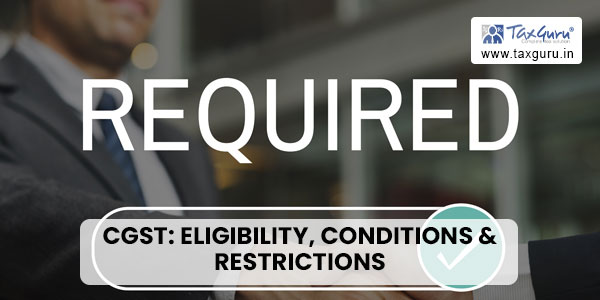Dive into the intricacies of CGST Section 16: Eligibility, Conditions & Restrictions for Input Tax Credit (ITC) on goods and services. Learn about the criteria, time limits, and consequences of non-compliance. Explore the importance of valid invoices, restrictions on personal consumption, and the reversal of ITC. Stay informed to navigate the complexities and avoid penalties while optimizing your tax benefits.
This article provides an in-depth analysis of Section 16 of the Central Goods and Services Tax Act (CGST), focusing on the eligibility, conditions, and restrictions for claiming Input Tax Credit (ITC) on goods and services for business purposes. It highlights the necessary criteria, time limits, and consequences of non-compliance with Section 16, offering valuable insights for registered taxpayers.
Section 16 of the Central Goods and Services Tax Act, 2017 specifies the eligibility and conditions for availing of the input tax credit on goods and services by a registered taxpayer for business purposes.
Here is an in-depth analysis of Section 16 of CGST:
Eligibility for Input Tax Credit (ITC): under section 16(1) a registered taxpayer is eligible to claim ITC on goods and services received for business purposes. He must fulfil the following conditions the certain conditions are:
1. He is in possession of a valid tax invoice or debit note issued by a supplier registered under the GST Act. (Section 16(2)(a)- Applicable from 1st July 2017)
2. Documents should appear in GSTR 2B (Section 16(2)(aa)- applicable from 1st Jan 2022)
3. Goods or services on which ITC is claimed have been received.(Section 16(2)(b)- Applicable from 1st July 2017)
4. Input tax credit not restricted u/s 38 (Section 16(2)(ba)- applicable from 1st Oct 2022)
5. The tax charged on the supply has been paid to the government by the supplier.(Section 16(2)(c)-applicable from 1st July 2017)
6. The registered person must have furnished the GST return u/s 39. (Section 16(2)(d)- Applicable from 1st July 2017)

Time Limit for Availing ITC: under section 16(4) The registered person can claim ITC within a specified time limit. For example, ITC for a financial year can be claimed till the due date of filing the GST return on 30th November of the following year or filing of the annual return, whichever is earlier.
Restrictions on Input Tax Credit (ITC): Section 16(2) of the CGST Act lists the following restrictions on claiming ITC:
1. ITC cannot be claimed for goods or services used for personal consumption.
2. ITC cannot be claimed for goods or services used for making exempt supplies.
3. ITC cannot be claimed for goods or services used for making taxable supplies that are not liable to tax under the CGST Act or the Integrated Goods and Services Tax (IGST) Act.
4. ITC cannot be claimed for goods or services used for making supplies in respect of which the supplier has not paid the tax.
5. ITC cannot be claimed for goods or services used for making supplies in respect of which the recipient has not paid the consideration within 180 days from the date of invoice.
6. Section 17(5) shall also be checked before filing the GST 3B while claiming the ITC in order to avoid non compliance with the stipulated law.
Reversal of Input Tax Credit (ITC): 2nd provision of Section 16(2) of the CGST Act, if the registered person fails to pay the consideration to the supplier within 180 days from the date of invoice, the ITC claimed earlier will be reversed.
Consequences of taking ITC without complying with Section 16
If a taxpayer claims an Input Tax Credit (ITC) without complying with Section 16 of the Goods and Services Tax Act, it may lead to certain consequences and ITC reversal.
- ITC reversal: The tax authorities can reverse the ITC claimed by the taxpayer if it is found that they have not complied with the provisions of Section 16. This means that the taxpayer will be required to pay back the ITC already claimed, along with any interest or penalties that may apply.
- Interest and Penalties: The taxpayer may be liable to pay interest on the amount of ITC reversed. The interest is typically calculated from the date of availing of ITC until the date of reversal.
- Reputational Damage: Non-compliance with tax laws can result in reputational damage for the taxpayer and their business. This can affect their relationships with suppliers, customers, and other stakeholders, leading to a loss of trust and potential business opportunities.
- Audit and scrutiny: Non-compliance with Section 16 may attract the attention of the tax authorities, leading to increased scrutiny and audit of the taxpayer’s records and transactions.
This can result in additional time, effort, and potential reputational damage for the business.
CONCLUSION: – In conclusion, section 16 of CGST specifies the Conditions and Eligibility For claiming ITC on goods and services received for business purposes, while also highlighting Restrictions on ITC and time limits for claiming ITC. It is important for registered taxpayers to understand the provisions of this section to avoid any errors or penalties while claiming ITC.
****
Article was written by: Mrs Swathi [Intern @ NRSR&Co, Manipa-Udupi]






section 16(2) (c) effective date is 01.01.2022. by finance bill 2021 how it be effective or apliacbale from 01.07.2017 restrospectively. Please calify your stand ”
The tax charged on the supply has been paid to the government by the supplier.(Section 16(2)(c)-applicable from 1st July 2017)”
Dear sir, Please share the notification number you are referring to that brought 16(2)(c) w.e.f 1.1.22.